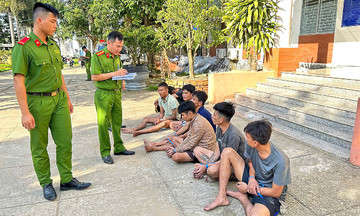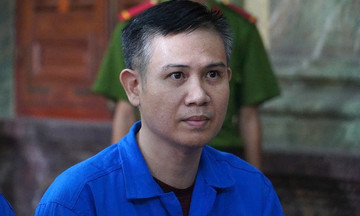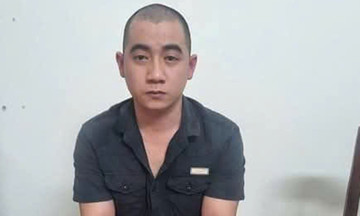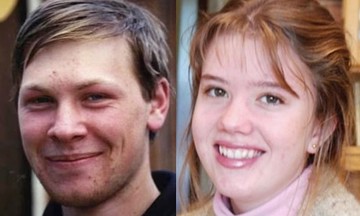Born 10 minutes apart on 24/10/1933 in London, Reggie was the elder twin. From a young age, both displayed a penchant for violence, honed their skills through rigorous martial arts training, and became amateur boxing champions.
Despite their similarities, distinct personality differences emerged, shaping their criminal paths. Reggie, the more composed and disciplined fighter, contrasted with Ronnie's relentless ambition to win at all costs.
John Pearson, the Kray twins' biographer, suggests their mother cultivated a sense of malignant narcissism in them. By encouraging them to see themselves as exceptional while indulging their every whim, she fostered an inflated self-importance that would define their criminal careers.
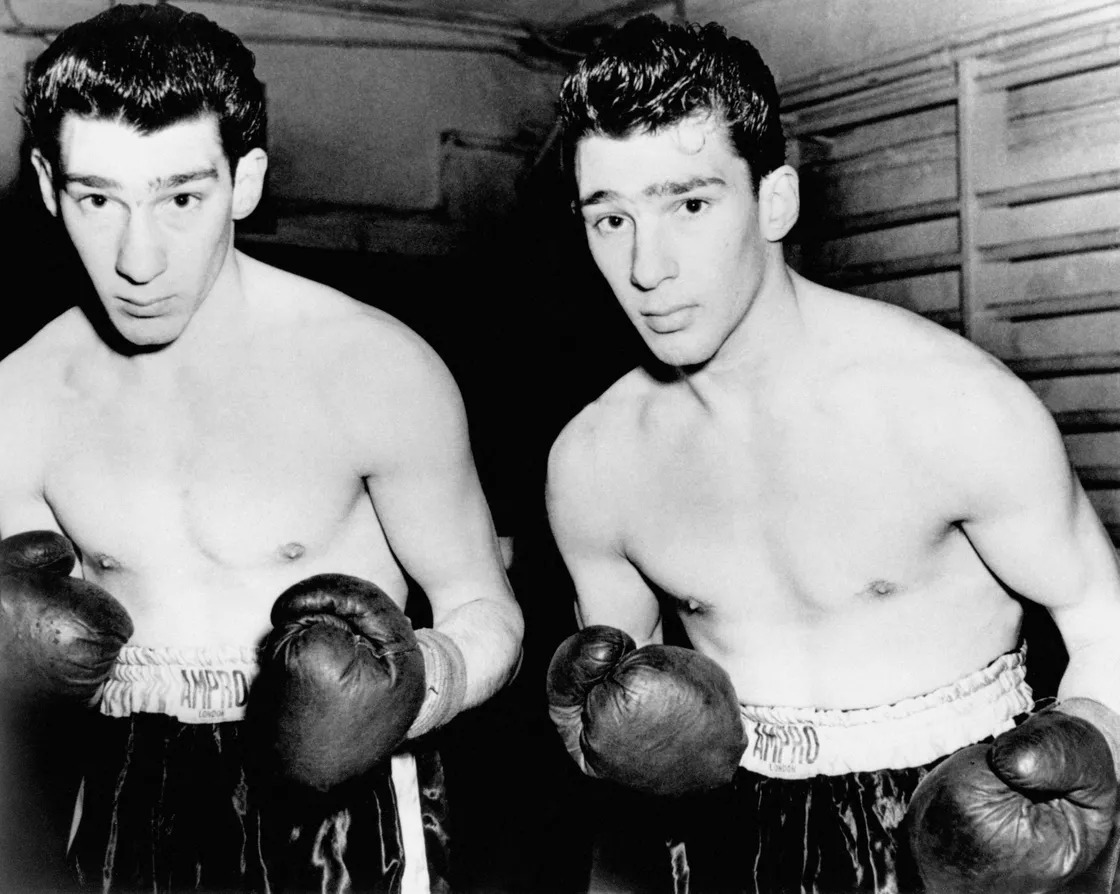 |
Ronnie (left) and Reggie Kray began their careers in the boxing ring, training at Klein's Gym in London. Photo: Alamy |
Ronnie (left) and Reggie Kray began their careers in the boxing ring, training at Klein's Gym in London. Photo: Alamy
A descent into crime began in their teenage years. The Kray twins quickly became involved in the criminal underworld of London's East End, a densely populated area known for its poverty and diverse immigrant communities.
In his memoir, *Born Fighter*, Reggie recounts an incident at 16 where he and his brother were charged with grievous bodily harm after assaulting a rival gang outside a nightclub.
Two years later, they were conscripted into the army. However, their violent behavior, including assaulting a police officer and other acts of insubordination, led to their dishonorable discharge in 1951 after just one month of service. Their insubordination included pouring urine over a sergeant and handcuffing a prison guard to their cell bars.
Their criminal activities soon escalated, encompassing armed robbery and truck hijacking. Simultaneously, they ventured into the nightclub business, transforming a rundown establishment in Bethnal Green into a glamorous hotspot. This marked the beginning of their ascent in London's underworld.
The Krays' criminal role model was Billy Hill, known as the "boss of Britain's underworld," who controlled Soho in the 1950s. Like Hill, they funded legitimate businesses with the proceeds of their criminal enterprises. As their empire expanded into protection rackets, arson, armed robbery, and black market tobacco trading, they acquired more nightclubs in the East End and central London.
Despite this veneer of legitimacy, violence remained central to their operations, fueled by Ronnie's increasingly uncontrollable rage. In 1954, he attacked members of a Maltese gang who attempted to extort protection money from their newly acquired Regal Billiard Hall.
To maintain a respectable facade, the Krays cultivated an image of philanthropy through charitable donations. However, Ronnie's erratic behavior undermined these efforts. In 1956, he was sentenced to three years in prison for stabbing a man. During his incarceration, Reggie continued to expand their criminal empire and opened the Krays' signature club, Double R, establishing their gang, "The Firm."
While imprisoned, Ronnie's mental health deteriorated. Diagnosed with paranoid schizophrenia in 1958, he was transferred to a mental hospital and treated with sedatives before being returned to prison. Upon his release in 1959, his appearance and temperament had drastically changed, marked by a coarsened physique and increased volatility.
By the 1960s, the Krays were renowned figures in London, controlling around 30 nightclubs, bars, and restaurants. They laundered money through dog and horse racing and various businesses, mingling with London's elite and entertaining celebrities. They even gave television interviews.
"Those were the best years of our lives," Ronnie recalled in his autobiography, *My Story*. "They called them the swinging sixties. The Beatles and the Rolling Stones were rulers of pop music, Carnaby Street ruled the fashion world... and me and my brother ruled London. We were untouchable."
Cultivating a "gangster chic" image reminiscent of Hollywood films, the Krays favored dark, double-breasted suits with slim ties and padded shoulders, complemented by ostentatious jewelry.
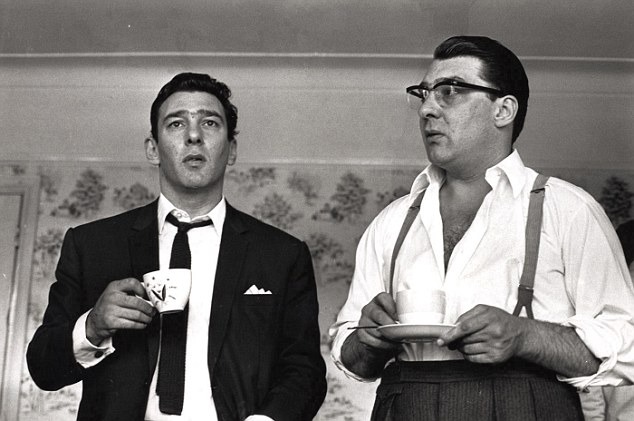 |
Reggie (left) and Ronnie Kray in a 1966 photograph. Photo: Hulton-Deutsch Collection/Corbis |
Reggie (left) and Ronnie Kray in a 1966 photograph. Photo: Hulton-Deutsch Collection/Corbis
Their nightclub network provided a platform for their rule by fear, where any perceived disrespect was met with swift and brutal retribution. Ronnie had long envisioned transforming their empire into a London equivalent of Murder, Inc., the notorious mafia "murder factory" of New York. In the 1960s, he realized this ambition, reportedly receiving guidance from American mafia figures on adapting their methods to London's gangs, forging a transatlantic criminal alliance.
This connection with the American mafia escalated tensions with the Richardson gang, another powerful force in London's underworld. The Krays sought to expand their gambling operations with mafia backing, but Ronnie felt the Richardsons were encroaching on their territory. Matters worsened when Richardson associate, George Cornell, allegedly insulted Ronnie at a club in December 1965, igniting a gang war.
The conflict intensified with the shooting death of a Firm member on 7/3/1966, with George implicated in the killing. On 9/3/1966, the Krays found George drinking at the Blind Beggar pub in their East End territory. In a brazen act of violence, Ronnie shot George in the head in front of witnesses. Despite his arrest, intimidation from the Firm ensured no one testified against him, and Ronnie was released.
A year later, Reggie became embroiled in a murder case. Despite evading justice for some time, the Kray twins' reign of terror was nearing its end. On 7/6/1967, Reggie's wife committed suicide at 23 after two years of marriage, citing his abusive behavior in her diary. Months later, seemingly consumed by grief and rage, Reggie brutally murdered Jack McVitie, a Firm member who failed to carry out a hit on a former associate. McVitie's body was never found.
McVitie's murder proved pivotal in the London Metropolitan Police's long-standing investigation into the Krays. Detective Chief Superintendent Leonard "Nipper" Read, who had launched a major operation against them in 1964, renewed his efforts in 1967. However, he faced the "wall of silence" prevalent in the East End, hindering any cooperation with the police. By late 1967, Read decided to arrest the Krays based on existing evidence, hoping witnesses would come forward once the twins were in custody.
On 8/5/1968, the Krays were arrested at their mother's apartment, along with 15 Firm members. Read employed a strategy of isolating and interviewing each member, offering deals in exchange for testimony against others. Under immense pressure, several Firm members, including Reggie's right-hand man, Albert Donoghue, cooperated with the police, implicating the twins.
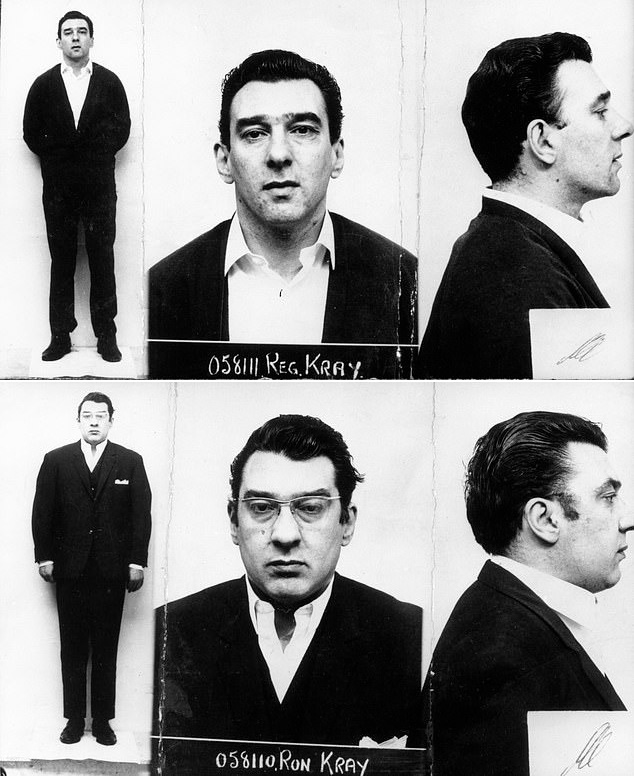 |
Reggie (top) and Ronnie Kray after their arrest for murder, May 1968. Photo: Metropolitan Police |
Reggie (top) and Ronnie Kray after their arrest for murder, May 1968. Photo: Metropolitan Police
Their trial, from January to March 1969, became a media sensation. Public demand to attend was so high that black market seats in the courtroom were sold for £5 a day. In March 1969, Ronnie and Reggie were sentenced to life imprisonment (the death penalty having been abolished four years earlier), with a minimum of 30 years for the murders of George Cornell and Jack McVitie. Even in prison, they continued to operate a business providing security services to celebrities and musicians.
Ronnie died of a heart attack in March 1995 at 61. Reggie was released on compassionate grounds in 2000 after being diagnosed with terminal bladder cancer and died a few weeks later.
The criminal lives of Ronnie and Reggie Kray have been depicted in several films, including *The Krays* (1990), *Legend* (2015), *The Rise of the Krays* (2015), and *The Fall of the Krays* (2016).
Tue Anh (according to ATI, BBC)







